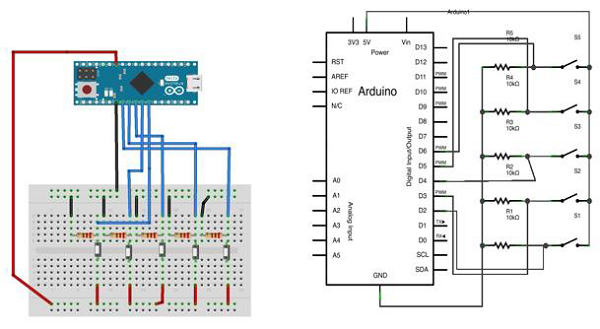Arduino - Kontrol Tombol Mouse
Dengan menggunakan perpustakaan Mouse, Anda dapat mengontrol kursor pada layar komputer dengan Arduino Leonardo, Micro, atau Due.
Contoh khusus ini menggunakan lima tombol tekan untuk memindahkan kursor pada layar. Empat tombol adalah arah (atas, bawah, kiri, kanan) dan satu untuk klik kiri mouse. Pergerakan kursor dari Arduino selalu relatif. Setiap kali input dibaca, posisi kursor diperbarui relatif terhadap posisinya saat ini.
Setiap kali salah satu tombol arah ditekan, Arduino akan menggerakkan mouse, memetakan input TINGGI ke kisaran 5 ke arah yang sesuai.
Tombol kelima adalah untuk mengontrol klik kiri dari mouse. Saat tombol dilepaskan, komputer akan mengenali acara tersebut.
Komponen Diperlukan
Anda akan membutuhkan komponen berikut -
- 1 × Breadboard
- 1 × Arduino Leonardo, papan Mikro atau Karena
- Resistor 5 × 10k ohm
- 5 × tombol tekan sesaat
Prosedur
Ikuti diagram sirkuit dan sambungkan komponen pada papan tempat memotong roti seperti yang ditunjukkan pada gambar di bawah.

Sketsa
Buka software Arduino IDE di komputer Anda. Pengkodean dalam bahasa Arduino akan mengontrol sirkuit Anda. Buka File sketsa baru dengan mengklik Baru.
Untuk contoh ini, Anda perlu menggunakan Arduino IDE 1.6.7

Kode Arduino
/*
Button Mouse Control
For Leonardo and Due boards only .Controls the mouse from
five pushbuttons on an Arduino Leonardo, Micro or Due.
Hardware:
* 5 pushbuttons attached to D2, D3, D4, D5, D6
The mouse movement is always relative. This sketch reads
four pushbuttons, and uses them to set the movement of the mouse.
WARNING: When you use the Mouse.move() command, the Arduino takes
over your mouse! Make sure you have control before you use the mouse commands.
*/
#include "Mouse.h"
// set pin numbers for the five buttons:
const int upButton = 2;
const int downButton = 3;
const int leftButton = 4;
const int rightButton = 5;
const int mouseButton = 6;
int range = 5; // output range of X or Y movement; affects movement speed
int responseDelay = 10; // response delay of the mouse, in ms
void setup() {
// initialize the buttons' inputs:
pinMode(upButton, INPUT);
pinMode(downButton, INPUT);
pinMode(leftButton, INPUT);
pinMode(rightButton, INPUT);
pinMode(mouseButton, INPUT);
// initialize mouse control:
Mouse.begin();
}
void loop() {
// read the buttons:
int upState = digitalRead(upButton);
int downState = digitalRead(downButton);
int rightState = digitalRead(rightButton);
int leftState = digitalRead(leftButton);
int clickState = digitalRead(mouseButton);
// calculate the movement distance based on the button states:
int xDistance = (leftState - rightState) * range;
int yDistance = (upState - downState) * range;
// if X or Y is non-zero, move:
if ((xDistance != 0) || (yDistance != 0)) {
Mouse.move(xDistance, yDistance, 0);
}
// if the mouse button is pressed:
if (clickState == HIGH) {
// if the mouse is not pressed, press it:
if (!Mouse.isPressed(MOUSE_LEFT)) {
Mouse.press(MOUSE_LEFT);
}
} else { // else the mouse button is not pressed:
// if the mouse is pressed, release it:
if (Mouse.isPressed(MOUSE_LEFT)) {
Mouse.release(MOUSE_LEFT);
}
}
// a delay so the mouse does not move too fast:
delay(responseDelay);
}Kode untuk Dicatat
Hubungkan papan Anda ke komputer dengan kabel mikro-USB. Tombol-tombol tersebut terhubung ke input digital dari pin 2 hingga 6. Pastikan Anda menggunakan resistor 10k pull-down.